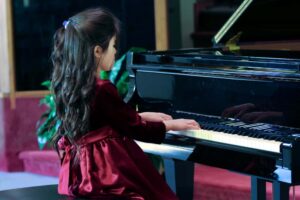 Many music students ask why they have to perform in a piano recital. What’s the purpose of these events? They may wonder – if it’s just to let others hear the students play, why not let them do that whenever they want?
Many music students ask why they have to perform in a piano recital. What’s the purpose of these events? They may wonder – if it’s just to let others hear the students play, why not let them do that whenever they want?
There are actually several reasons why piano recitals are helpful for music students. If your child is taking piano lessons in Atlanta, and you’re wondering why they’re performing in a recital, keep reading to find out.
It’s a Way of Expression
Performing, with the guidance of piano teachers, gives musicians a chance to express themselves in ways that they otherwise may not be able to. Music isn’t like speaking or writing. Some people aren’t able to truly express themselves in those forms, but they can pour their heart and soul into their piano playing. A recital gives them a platform from which to share themselves with others.
It Provides a Larger Stage
While it’s true that piano students can play for their friends and family at home, there’s something about being on a larger stage in front of more people that makes playing feel special.
It’s more than just playing in their home or for a small number of people. Being on the stage under the lights and in front of the audience is different, and it makes students feel special.
This larger space also gives them a chance to share their love of piano with their extended family and friends. It’s not always easy to fit many people into their practice space.
If your living room or den where the piano is located is on the small side, only a few people may have actually heard your child play. At a recital, there’s room for a large audience, so you can invite the entire family. This lets your child show how far they’ve come in their lessons.
It Gives Them Motivation
If a student knows that they have a recital date coming up, they’re going to be motivated to practice a little more and really work at polishing the pieces they’re going to play. Students who go into recitals unprepared are not likely to make that mistake again, so they will be very motivated to manage their practice time better.
In addition to motivating students to practice for the recital, students are also more driven to learn after the recital. Students will feel accomplished after a recital, and their hours of hard work will be recognized. Many come out of a recital ready to learn new songs and really push their playing to the next level.
Another way recitals provide motivation is through watching others perform. Students may see younger pianists perform and realize just how far their own skills have come. Then they may watch the older students at the recital and become motivated to reach their level.
Students Learn About Nerves
Up to this point, it’s possible your child has never been on stage before. They may have stood up in front of their class at school to give a presentation, but they may not have truly been in front of a group larger than 25 to 30 people.
A recital may be their first experience with dealing with nerves. It’s a good time to talk to them about being in front of a group and how to work on accepting and dealing with nervousness. The lessons they learn here can be useful later in life when they have to engage in public speaking and conference presentations.
Is Your Child Learning to Play?
If your young one is interested in learning to play the piano or other instrument, there’s no time like the present to enroll them in lessons. We provide music lessons in the privacy of your own home, making it easy for students to learn piano. Contact us today for more information.
